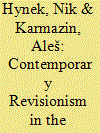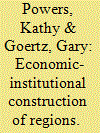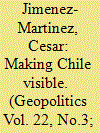|
|
|
Sort Order |
|
|
|
Items / Page
|
|
|
|
|
|
|
| Srl | Item |
| 1 |
ID:
173230


|
|
|
|
|
| Summary/Abstract |
In opening this special issue, our conceptual essay reclaims the importance of revisionism for regional analysis. It identifies and offers key conceptual and analytical tools for a multifaceted analysis of revisionism, discussing its various forms in relation to the aims and risk propensity of a given country. As a transdisciplinary and theoretical eclecticism, dilemma analysis is utilised to bridge the divide between political science, international relations, and security studies. To ascertain the extent of revisionism, we offer and operationalise six dilemmas seen as central for grasping its contemporary parameters: political order, political regimes, technology, migration, the economy, and the international system.
|
|
|
|
|
|
|
|
|
|
|
|
|
|
|
|
| 2 |
ID:
108507


|
|
|
|
|
| Publication |
2011.
|
| Summary/Abstract |
The international relations literature on regionalism, both in economic and security issues, has grown dramatically over the last 15 years. One of the ongoing issues discussed in most articles and books is the conceptualisation of 'region'. Instead of thinking about regions using notions of interdependence and interaction we take a social constructivist approach, whereby states themselves define regions via the construction of regional economic institutions (REI). We explore how a conceptualisation of region based on REIs contrasts with various related concepts such as regional system, and regional IGO. Empirically, we show that most all countries belong to at least one important regional economic institution, REI, (for example, EU, Mercosur, ASEAN, etc). In short, the world is dividing itself into regions by the creation of regional economic institutions. We contrast our economic-institutional approach to regions with Buzan and Wæver's 'regional security complexes' which is based on security dependence. There are interesting agreements and disagreements between their approach and our economic-institutional approach to defining regions. It is perhaps not surprising that many REIs have taken on security roles, which we briefly show by looking at military alliances embedded in REIs. This suggests that policymakers are creating regions through institutional innovations that link economic and security issues.
|
|
|
|
|
|
|
|
|
|
|
|
|
|
|
|
| 3 |
ID:
155453


|
|
|
|
|
| Summary/Abstract |
Chile has become the paradigm of nation branding in Latin America, employing branding initiatives to try to shake off the uncomfortable past of Augusto Pinochet’s dictatorship, as well as to create a ‘new’ image that fits into a globalised and neoliberal world. Whilst there has previously been some analysis of Chile’s branding efforts, the viewpoints of the local actors involved in these initiatives have largely been ignored. This article addresses this issue, examining the tensions faced by different individuals who have taken part in nation branding in the country. Drawing on interviews with some of these individuals, this article examines three areas of tension: (1) the conflicting purposes guiding the practice of nation branding, (2) the difficulties around the operationalisation of nation branding and (3) the controversies regarding the intended audiences for their efforts.
|
|
|
|
|
|
|
|
|
|
|
|
|
|
|
|
| 4 |
ID:
086991


|
|
|
|
|
| Publication |
2009.
|
| Summary/Abstract |
We are delighted to see that Arzheimer and Carter (2009) have taken up the challenge to discuss possible flaws in our (Kestila and Soderlund 2007) application of political opportunity sturcture theory in the subnational context.They address several interesting questions in their critique of our paper, and they make some good points worth considering in future research.
|
|
|
|
|
|
|
|
|
|
|
|
|
|
|
|
|
|
|
|
|